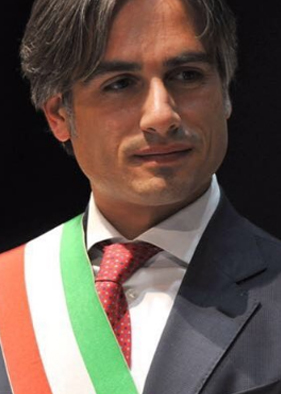August 2021, Year XIII, no. 8
Giuseppe Falcomatà
The Writer Mayor
"I’ve written two novels and I’m working on a third. For me writing is therapeutic and I’m lucky to have found some crazy editors who have the guts to publish them for me."
Telos: Every time someone talks about the direct election of the Prime Minister, people use the very evocative expression “Mayor of Italy”. So, is it true that Mayors have, in the administration of their own city, more power than the Prime Minister has today?
Giuseppe Falcomatà: Unfortunately, that’s not how it is. Yes, it’s true, in these years mayors have become a very popular model, but today they are also on the frontlines in dealing with the country’s problems, frustrations and the difficulties of citizens, especially in the most critical historical period Italy has ever known and lived through from the post-war era on.
Mayors always have more responsibility to handle and no protection when it comes to situations that are often delicate and complex. If we are talking about power, the power that mayors are asking for, as an example, is to have a say in the choices relating to the National Recovery and Resilience Plan and the Recovery Fund.
We need horizontal leadership with shared proposals and, at the same time, we need to monitor activities to summon everybody to take shared responsibility. Only by taking into account the proximity and the voice of the local areas can we carry out projects and create infrastructure and services that can truly change the face of our cities and the near future of our Country.
The breakdown in the party system has very likely been the source of people’s widespread anti-political sentiment. And yet this gap between citizens and politics is not nearly as wide when it comes to the Mayor. Are your citizens still passionate about politics?
I think the citizens have a deep desire to participate. What they have become allergic to over time is self-referencing politics, which only thinks about itself.
In our city, every day committees spring up to safeguard a public good or there are spontaneous demonstrations of people who really care about the destinies of their neighbourhoods.
Critical, essential input also for an administration that is committed to improving itself and growing on a daily basis.
It is an admirable commitment. There is no question that today this stems from a sense of civic duty, not from parties that are either devastated by scandals or by election reforms that drain local drive or even by overly personalising political proposals.
The point is that the citizens trust their mayors, because they are close to them, because they are an institution that is part of the community, in touch with its problems. And this is why at the local level you feel far less anti-political detachment.
Last 7 July in Rome there was the “Demonstration to Defend the Dignity of Mayors”, which was highly attended by first citizens, yourself included. Could you explain why this protest was held and what you were demanding from the government?
As the National Association of Italian Municipalities (ANCI), several times we have asked for greater protection for city administrators, who often become the willing targets of glaring injustice. The Mayor is often a man alone who, in his solitude, has to work to guarantee the good of the community.
In Rome, my colleagues and I were asking for respect after what happened in Turin and Crema, though I can also mention dozens of other grave incidences like these where mayors were convicted for circumstances that were totally outside their mandate.
We don’t want impunity, we are not asking to be placed above the rules, just that the principle of individual, personal responsibility be respected, and mainly that mayors be given dignity through regulatory instruments that allow them to work in peace, without always risking having to personally pay for things they are not liable for.
In this Country people have been taking potshots at mayors for far too long because they are the conductors for all the city’s problems and the first outpost for all citizens' expectations. We cannot wait any longer to reform the Consolidated Text of Local Institutions (TUEL) in this direction.
This is your second term as the Mayor of Reggio Calabria, a city that is as beautiful as it is difficult. Let’s not forget that in 2014 you were elected after two years of State receivership because it had been infiltrated by the mafia. What are the main issues that still need to be resolved in your city administration? And the goals you have reached in these years?
The years the city was under State receivership were particularly dramatic for the citizens of Reggio Calabria. The municipality was on the verge of financial collapse and every day a social bomb was ready to explode.
When we got into office there were no more services; taxes were sky-high due to a blood, sweet and tears- balancing scheme; there was a crisis in the public-private utilities and the consequent risk of losing thousands of jobs. Not a week went by when even City employees weren’t going to the city squares to protest. Dark times that it was hard to emerge from. With patience, responsibility and a lot of commitment we managed to get the boat moving in the right direction. We managed to finish the Payment Plan early and avoid default and saved workers by creating in-house companies. We launched an incisive campaign to eliminate job instability in public administration by offering stability to hundreds of Socially Useful Workers (LSUs). We did an excellent job of managing and spending European funds and were among the top-ranked in Italy for financial reporting. Although we were unable to get even one euro from the ordinary City budget, we opened three kindergartens and engaged in the most important national battles to lower the criterion for historical costs in the distribution of state resources.
We did it on our own, and we have no one to thank if, today, we have approved Zone Plans for the social sector that reshape citizens’ welfare or if the local public transport company, saved from the nightmare of bankruptcy, can boast the most modern transport park in the country and has begun hiring new and important professional figures again. We are inaugurating fantastic public works projects like the Waterfront, the reclamation of important city squares, the new Parco Lineare Sud, sports facilities and then, the icing on the cake, Zaha Hadid’s Sea Musuem, one of 14 strategic works crucial to relaunch the Italian economy after the pandemic.
After the disgrace of having to sack the entire City government because of its ties to the mafia, we have managed to restore our credibility within the Institutions, that now, fully back our plans and are investing in the territory. Lastly, in terms of time, the 45 million euros of financing from the “Qualità dell’abitare” housing quality programme, essential to revamp three neighbourhoods in the city outskirts.
So, Reggio is a city that is looking towards a better future with hope and that, with the funds of the National Recovery and Resilience Plan, is facing a new, perhaps the final, challenge to its definitive relaunch.
There are still problems, the biggest being the crisis of the integrated waste cycle, and we are working intensely on that to free the area of endemic issues stemming from decades of inefficiency that have brought the entire regional waste collection and disposal system to its knees.
Marco Sonsini
Editorial
In this issue of PRIMOPIANOSCALAc we will be interviewing another Mayor, and a special one. Why is he special? He is on his second term, young (even by non-Italian standards), a professional, a writer and the son of a mayor.
We are talking about the Mayor of Reggio Calabria, Giuseppe Falcomatà, a clear exception to what, for the last few years, seems to be the rule: Being Mayor is the best job in the world that no one wants to do anymore but which former Milan Mayor Gabriele Albertini defined as “a conscious kidnapping”.
The days of Walter Veltroni, Francesco Rutelli, Antonio Bassolino and Matteo Renzi seem long gone, days when running a city was considered a springboard to national politics. Yet for a young person who loves politics, an experience in local public affairs is still important: being a member of the City Council, not to mention a City Assessor, is a good overall experience that allows you to understand how the institutions work. But today being mayor is fraught with risk. The criminal risk, for example, of having to answer for anything that happens in your municipality, which, along with the job’s huge amount of responsibility, makes potential candidates think twice before running. So, it is hard to find quality candidates. This is exactly why a demonstration was held last 7 July in Rome with a high turnout of Mayors.
“We were asking for greater protection for city administrators, who often become the willing targets of glaring injustice. The Mayor is often a man alone who, in his solitude, has to work to guarantee the good of the community,” says Falcomatà. This was echoed by Mattia Palazzi, Mayor of Mantova, when he said, “Maybe we’re all crazy because we love our cities, but also overly responsible, and now we’re tired of being heroes. We just want to do our job.”
Falcomatà, certainly is crazy about Reggio Calabria. So much so that he decided to run for Mayor for the first time after the city had just been through two years of State receivership after the entire City Council was sacked due to its ties to the mafia, years that he calls ‘dramatic’. He got the city back on its feet and people appreciated him so much he was re-elected for a second term hands down. Once people said that a sitting Mayor had an advantage because 5% of the votes were secure right from the start. Then, according to some political analysts, from 2011 to 2017 this trend reversed and running again after five years was almost considered a handicap. But from 2018 on, there have been signs that outgoing, first-term mayors are once again beginning to gather steam, but only if they have done a good job running their cities. Falcomatà is one of them.
The subheading of our August interview is another exception. For the first time it is not a quote from Falcomatà’s answers to our questions, but his reply when we asked him for something personal to add to his profile. And it is also what inspired the title: The Writer Mayor
This month cover of PRIMOPIANOSCALAc is a page ripped to reveal a portion of the interview beneath in Italian and English, with an insect looking up at the words.
We have selected an extraordinarily beautiful stick insect to represent Falcomatà: Extatosoma tiaratum, named after its resemblance to leaves that allow it to easily camouflage itself.
It is bright green in colour and even has some ridges running down the centre of its body that look like leaf veins. It will often sway slightly to the left and right, imitating the swaying of leaves in the wind.

Giuseppe Falcomatà is the Mayor of Reggio Calabria, elected for the first time in 2014 and re-elected in 2020 with a centre-left coalition. In 2011 he became a municipal councilman and was the leader of the City Council Democratic Party group.
Since 2002 he has been on the Board of Directors of a foundation named after his father, Italo Falcomatà, who was the Mayor of Reggio Calabria from 1993 to 2001, during the so-called Reggio Spring.
Falcomatà has a degree in Law from “Mediterranea” University in Reggio Calabria and in 2008 he went on to study at the Specialization School for Public Administration Studies (SPISA) in Bologna. Since 2010 he has been working as a lawyer.
In 2012 he published his first novel, La vendetta immobile and in 2014 his second, Un passo alla Svolta. He is currently working on a third and says the following about his commitment to writing: “For me writing is therapeutic and I am lucky to have found some crazy editors who have the guts to publish them for me ![]() ”. He is passionate about sports: “I love football. I played non-professional for 20 years (on defence with crooked feet but large lungs) and now I still play with friends and in games for charity. I’m a fan of Reggina (the local football club) and Viola, our amazing basketball team.”But those aren’t all his hobbies: “ Every Christmas I make a nativity scene from cork and Styrofoam. I got this passion from my dad, but he made his with papier-mâché.”Falcomatà is 38 years old and married to Giovanna Monorchio. They have two sons: Italo and Marco.
”. He is passionate about sports: “I love football. I played non-professional for 20 years (on defence with crooked feet but large lungs) and now I still play with friends and in games for charity. I’m a fan of Reggina (the local football club) and Viola, our amazing basketball team.”But those aren’t all his hobbies: “ Every Christmas I make a nativity scene from cork and Styrofoam. I got this passion from my dad, but he made his with papier-mâché.”Falcomatà is 38 years old and married to Giovanna Monorchio. They have two sons: Italo and Marco.







SocialTelos